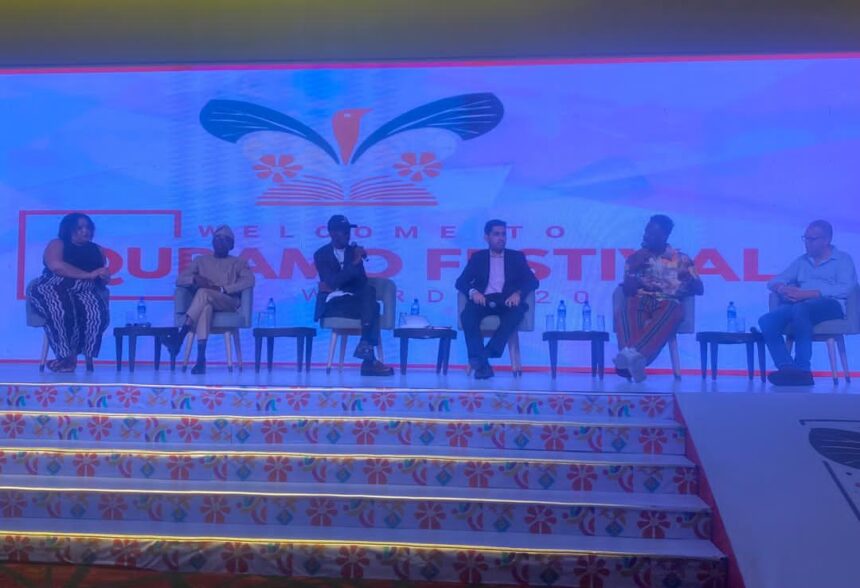Artificial Intelligence (AI) took centre stage at this year’s Quramo Festival of Words (QFest 2025) as thought leaders, innovators, and creatives converged for a panel discussion titled “AI Awakening: Weaving African Narratives in the Web of Creativity, Truth & Tomorrow.”
Convened by Publisher Gbemi Sasore, and held on Saturday, October 4, 2025, at Eko Hotels & Suites, Victoria Island, Lagos; the session explored how Artificial Intelligence is transforming storytelling, reshaping truth, and redefining Africa’s creative future.
Moderated by Ridwan Adelaja, a poet, journalist, and communications specialist known for bridging the worlds of technology, art and culture with humour; the conversation drew a full audience eager to engage with one of the festival’s most forward-looking topics.
What You Should Know
Joining Adelaja on stage were panelists whose expertise spanned technology, creativity, and innovation:
- Obinna Okerekeocha, Creative Director, Filmmaker, and Director of Content at Moniepoint;
- Dele Sikuade, CEO of Countersoft, owners and developers of Gemini software;
- Olajumoke Coker, Associate at ALP NG & Co and former QFest festival director;
- Kapil Chandwani, Legal Consultant and CEO of Anrak; and
- Nurudeen Soremekun, Software Engineer and CTO at Iwelabi Consulting Ltd.
Adelaja set the tone for a conversation that touched on innovation, culture, and the African narrative in a rapidly changing world.
Together, they examined the evolving relationship between AI and African storytelling, from how algorithms can amplify creative voices to the ethical dilemmas surrounding truth and authorship in the digital age.
Audience members listened to exchanges from the panelists, with discussions also touching on data ethics, accessibility, job loss, new opportunities, and how African creators can harness AI tools to tell more authentic stories
The session was one of the standout events of Quramo Festival of Words 2025, which further reaffirmed the festival’s commitment to exploring the intersections of literature, technology, and contemporary African identity.
“I enjoyed the session, honestly. It’s not the usual panel where too many technical jargons fly around to confuse the audience,” Fiddausi Adamu, an audience at the event stated. “The panelists did a good job to break down AI to a relatable level. And, I can’t wait to explore it myself.”
For Damilola Odunukan, a writer and broadcaster, the session “helped her gain clarity.” She said, “I was there for the AI session, because I am currently trying to explore how to leverage it to enhance my work and productivity as a writer.
“Also, I wanted to demystify the myth of AI taking writers jobs. From the session, I got clarity. It was a good Saturday outing for me,” she added.
Also speaking about his experience, Zulqarinain Suhyib, a language translator and scholar, appreciated the organising team for the resources invested into the running of the annual festival.
“I am glad I attended. It was a good experience. I think the Quramo team deserves to be commended for curating the session as part of the Festival this year,” he noted.
Reflections from the Panel Session
AI itself, without human touch, is dumb —Dele Sikuade
AI, according to Dele Sikuade, is only as brilliant as it is programmed. Sikuade noted that people should not be afraid of AI taking up their roles as the technology itself relies on instructions from humans to make it perform.
“We all should work towards playing in the space as there are many opportunities for people to throw in their hats into the ring,” he said. “It’s a technology that is not as smart as a 3-year old,” he emphasised.
“In storytelling, for instance, you own your story. As a professional writer, you should infuse your signature nuances. AI can only guide you in the planning or by suggesting forms. You have a choice to accept, reject, or modify.”
Soon, we may have to contend with the monster in AI through court settlements —Olajumoke Coker
Speaking on the outlook of the industry, and what to expect in about 5-10 years, the legal counsel envisaged the prevalence of legal tussle between corporations, individuals or both fighting to protect rights or seek redress through the court.
“In 5-10 years, the kind of conversation we will hold on AI may change drastically,” Olajumoke stated, expressing fears on the inherent abuse that may fester with people committing crimes and offenses behind the cover of AI prompts.
“Deep fakes may shape the future as there are so many image and video distortions going on with AI. Of course, as a person, I acknowledge that there are so many wonders and good things about AI. It is exciting to see how it helps us deliver much faster. My only worry is the new wave of abuse and misinformation that it may aid. This can have legal consequences.
“I do not think there should be any concern as to who owns a piece created by AI. Asking whether an end-user, the software company or an app owns the right to a piece is like suggesting that there is a debate as to who owns a photo taken with a Sony camera. No, we do not have such debates. We all know the photographer owns it, not Sony as a company or Adobe Photoshop as an editing app,” the legal counsel submitted.
AI doesn’t lay people off from work. Humans do — Obinna Okerekeocha
“Nobody should be afraid of AI. It is a technology like any other technology out there, and it has come to stay. The role of any technology is to enhance and disrupt life. That is exactly what AI is doing, and the creative industry is not an exception,” he said.
“The right question we should be asking is, ‘How can I play in the space? What can AI do for me in my profession? What do I need to learn to be ahead by leveraging AI?’ Whoever you are, whether a writer, lawyer, filmmaker, designer, teacher or a cobbler, you should not be caught unaware,” he charged.
“It is important I equally address this bias flying about. AI doesn’t lay people off from their work space. It is people’s unwillingness to adapt and enhance their skillset that will lay them off, ultimately. It is not the technology. It is the skill gap and adaptability deficiency in real sense.
“As a player in the AI space, especially as a creative, I believe that AI has come to give us a new way of experiencing and experimenting with content and tasks delivery. It is an alternative window to explore and produce art. Embrace it.”
We must build African native intelligence if we must win —Nurudeen Soremekun
“The best search engine today is AI. Yet, for the African context, a lot of data-sets that will fit and match queries are still missing,” he noted.
“As a developer, I know for a fact that there is so much more to cover in the space. And, rather than dwelling on what AI is taking away, we can embrace the new culture and strategically plug into the development of indigenous products that speaks our language, value, culture, and history.
“The good news is that nobody can do this better than us. AI won’t do it itself. Humans, like all of us, will. Anyone with enough exposure and interest can contribute,” he submitted.
AI gives us an opportunity to co-create, and not compete —Kapil Chandwani
“We should see AI from the lens of speed and as an electronic assistant. This is one of the things we help people realise in my company, Anrak. We are building technology that fits the future ahead of all of us,” he stated.
“Life will continue to get faster. That’s the truth. There are so many tasks that should no longer require our attention. The best thing to do is to outsource it while we focus on other serious tasks that cannot be achieved by a machine. That’s the new world order.
“AI will not independently give you a finished or perfect piece. Sure, it can give you structure, set the tone, or even suggest common patterns. The human character is still required to do the rest of the job.
“So, what should ordinarily take 3 days of research and another extra 2 days of preview, can happen in 2 days. It is more of a co-creation tool than something anyone should want to compete with,” Kapil concluded.
About Quramo
Quramo Publishing is an independent publishing house dedicated to producing content across diverse genres and audiences.
Its growing portfolio features several imprints, including Q Books, Mango Books, The Kuramo Report, and CLRN Direct.
The company’s publishing mission spans cultural history, contemporary fiction, non-fiction, and academic works, as well as specialised titles that document pivotal events and capture the essence of their era.
Talking Points
It is remarkable that Quramo Festival of Words 2025 placed artificial intelligence at the heart of its programme, showing how deeply technology now intersects with creativity and culture across Africa.
By curating the session “AI Awakening: Weaving African Narratives in the Web of Creativity, Truth & Tomorrow,” the organisers created a much-needed platform to explore how AI is influencing storytelling, authenticity, and the future of African innovation.
At Techparley, we see this as a defining moment for the continent’s creative ecosystem, a sign that the conversation around AI is no longer limited to labs and tech hubs, but now part of cultural and artistic expression.
The panel’s diversity, spanning filmmaking, law, software engineering, and AI strategy reflected the multidisciplinary nature of creativity today, where technology and imagination increasingly coexist.
With forums like Quramo Festival paving the way, we see an exciting opportunity for collaboration between artists, technologists, and policymakers. Indeed, this is how “Africa can weave its own narrative” in the digital age, one that balances innovation with identity.





